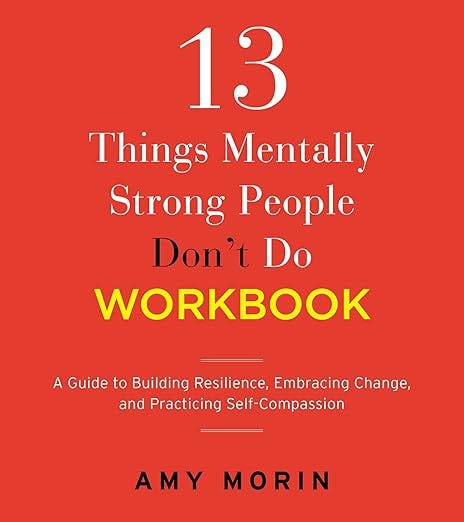You’re only as good as your worst habits.
Amy Morin was the first person to introduce the world to the concept of mental strength with her internationally bestselling book, 13 Things Mentally Strong People Don’t Do. Since then, the conversation around mental health has dramatically evolved.
Topics that were once taboo—anxiety, therapy, self-care—no longer carry stigma, and more and more people are looking for ways to become happier, healthier, and more resilient. But as Morin knows best, mental strength is a muscle—and to get stronger, you have to put in the work.
Morin positions easy-to-follow prompts and unique activities like:
Change the channel in your brain to stop ruminating
Calculate levels of fear to take more risks
Change your language into empowered mentality
Name your emotions to avoid discomfort
Here are 13 big ideas from the book (+ you can listen to the audiobook summary as well - hint: it is way cooler than you can imagine!)
Complaining about how bad your life is will likely wear on people rather quickly. No one ever says, ‘What I really like about her is the fact that she always feels sorry for herself.’
1. They Don’t Waste Time Feeling Sorry for Themselves
Self-pity is described as a self-destructive habit that mentally strong people avoid. Instead of dwelling on life's misfortunes, they focus on gratitude and move forward by taking proactive steps.
Self-pity, she explains, wastes mental energy, fuels negative emotions, and prevents growth. Mentally strong individuals choose to replace self-pity with gratitude and find meaning even in challenging circumstances.
“It’s impossible to feel sorry for yourself when you’re actively doing something meaningful for others.”
2. They Don’t Give Away Their Power
Mentally strong people maintain control over their emotions and decisions. They avoid letting others influence their choices or dictate their feelings. Amy Morin emphasizes the importance of asserting oneself and establishing boundaries.
By doing so, mentally strong individuals retain their autonomy and make decisions aligned with their values rather than succumbing to external pressures or manipulations.
Gratitude isn’t about thinking, ‘I deserve better’; it’s about thinking, ‘I have more than I deserve.’
3. They Don’t Shy Away from Change
Change can be daunting, but mentally strong individuals embrace it as an opportunity for growth. Amy Morin argues that resisting change often stems from fear of the unknown, which can limit personal and professional development.
By reframing change as a challenge rather than a threat, people can build resilience and adaptability, positioning themselves for success in evolving circumstances.
4. They Don’t Focus on Things They Can’t Control
Worrying about uncontrollable factors is counterproductive. Mentally strong people focus their energy on what they can influence, allowing them to achieve meaningful progress.
By letting go of concerns about external events or other people's actions, they free themselves from unnecessary stress and can channel their efforts into proactive and achievable goals.
5. They Don’t Worry About Pleasing Everyone
The need for universal approval is a trap that mentally strong individuals avoid. Amy Morin highlights that striving to please everyone often leads to compromised values and personal dissatisfaction.
Instead, mentally strong people focus on their priorities and act with integrity, understanding that it's impossible to make everyone happy.
6. They Don’t Fear Taking Calculated Risks
Mentally strong individuals evaluate potential risks and take action based on informed decisions. Fear of failure often prevents people from seizing opportunities, but Amy Morin emphasizes the value of stepping out of comfort zones.
By assessing risks thoughtfully, mentally strong people maximize their chances of success while learning from any setbacks.
7. They Don’t Dwell on the Past
Living in the past can hinder present and future happiness. Mentally strong people acknowledge their past experiences, learn from them, and move forward.
Amy Morin underscores that dwelling on past regrets or mistakes prevents individuals from enjoying their current opportunities and building a better future.
8. They Don’t Make the Same Mistakes Over and Over
Learning from mistakes is a hallmark of mental strength. Amy Morin explains that identifying patterns of behavior and making conscious changes to avoid repeating errors is essential for growth.
Mentally strong people reflect on their actions, take responsibility, and implement strategies to improve outcomes in the future.
9. They Don’t Resent Other People’s Success
Resentment is a toxic emotion that distracts from personal goals. Mentally strong individuals celebrate others' achievements and focus on their progress.
Amy Morin highlights the importance of shifting from envy to inspiration, allowing people to view others' success as motivation rather than competition.
10. They Don’t Give Up After the First Failure
Failure is an inevitable part of growth. Mentally strong people see failure as a stepping stone rather than a roadblock.
Amy Morin illustrates how persistence and resilience enable individuals to overcome setbacks, refine their approach, and ultimately achieve their objectives.
11. They Don’t Fear Alone Time
Solitude is valuable for reflection and self-growth. Mentally strong individuals embrace alone time to recharge and gain clarity about their goals.
Amy Morin stresses that fearing solitude often stems from discomfort with self-awareness, which can be overcome by practicing mindfulness and self-compassion.
12. They Don’t Feel the World Owes Them Anything
Entitlement is a hindrance to success. Mentally strong people understand that rewards come from effort and perseverance, not from a sense of deservingness.
Amy Morin encourages readers to adopt a mindset of gratitude and personal accountability, recognizing that hard work is the key to achieving their goals.
13. They Don’t Expect Immediate Results
Patience is a critical component of mental strength. Mentally strong people understand that meaningful achievements take time and consistent effort.
Amy Morin advises against the temptation of instant gratification, advocating for persistence and long-term commitment to overcome obstacles and reach desired outcomes.











